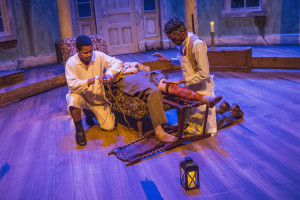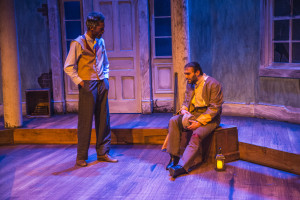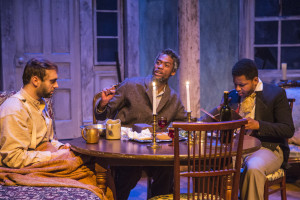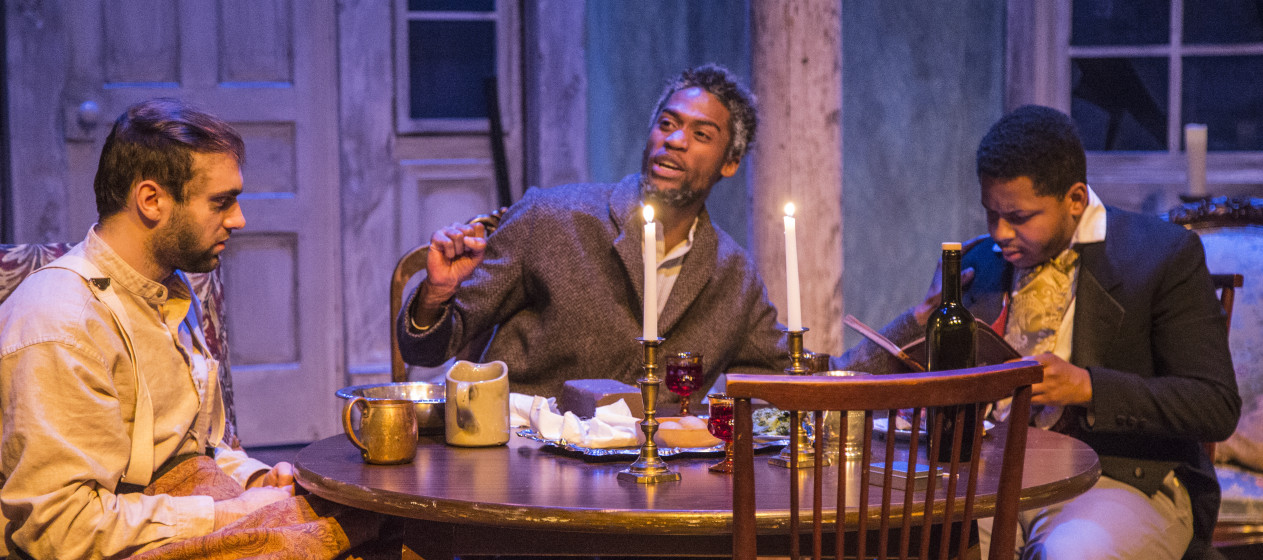“The Whipping Man,” a Story of Slavery and Freedom
The Department of Theatre and Dance at FSU opened the semester with a rousing, poignant production of Matthew Lopez’s celebrated play “The Whipping Man” on Friday, Feb. 27. A second weekend of shows is scheduled for March 5-7.

Set in the post-Civil War South, the play features characters struggling to live with their pasts as a new era dawns. This production, directed by Mairzy Yost-Rushton, doesn’t simply take up the powerful themes of the show, it transforms them into living relics of a nearly forgotten time. Set over three days in 1865, the play watches as three men in Richmond reminisce, remember, and plot their individual futures.
The show opens with Caleb, played passionately by senior Theatre major Nathaniel Kidd, as he returns from his post in the Confederate Army. A quick assessment reveals that Caleb is injured and his long-time enslaved housekeeper Simon, exquisitely played by junior Gershawn Mason, enters soon after to suggest a necessary amputation. What ensues from there is part rekindled friendship, part nurse and patient, and part slave and master. The audience experiences this rise and fall, and tension increases throughout the initial scenes until finally Caleb reverts back to a slave-owning Southerner, and Simon attempts to shake the chains. It is the realization that the North won that neither character addresses directly; rather the audience watches slowly as each man reckons with the definition of freedom.

This production is Simon’s to steal, and Gershawn Mason rises to the occasion. Figuratively and literally, it is on Mason’s back that the audience is carried through the show, and that we see the legacy of slavery. While it may be too soon to compare Mason to Morgan Freeman in The Shawshank Redemption, future audiences will likely see this level of talent from him.
The play’s comic relief comes in the form of John, played by the gratuitously funny Christian K. Scott, a junior in the Theatre Department. Scott can’t help but be hilarious; and then, when matters turn more serious, he can’t help but hypnotize. “You lost, and we won,” John tells Caleb, both in jest and in fact. It is this sort of character, one who is at once a comedian and at other times a systematically abused enslaved person, that Scott is tasked with. To say he performs well under pressure would be an unimaginable slight. Indeed, Scott meets the demand of the character and exceeds expectations.
Not to be outdone, Nathaniel Kidd convincingly plays a newly maimed man who has yet to acknowledge his sins. His struggles are ones that most cannot relate to, which makes Kidd’s successful performance all the more triumphant.

The story continues, with unpredictable twists and heartbreaking turns. While this may be typical for a play set with a backdrop of slavery, the most unique twist is that these characters are Jewish. An overlooked historical fact is that Passover aligned with the end of the Civil War and presents these characters with an unusually reflective occasion. As Simon prepares the bitter herbs of collard greens, swipes a handful of “hard tack” bread rations, and substitutes celery for parsley, the three men sit down to celebrate the freedom of the Jewish people from the Pharaoh.
For the actors, this environment allows for further understanding. “I want people to know that slaves weren’t just Christians, and that there were also Jews,” reminds Scott.
Moreover, the remembrance of slavery is almost entirely relegated to those that were field slaves. Scott hopes that “The Whipping Man” helps to “show the relationships between a master and their house slaves,” which Scott considers to be a forgotten group.
The show’s playwright, Matthew Lopez, told The New York Times in 2011, “We as Americans have to take responsibility for our past, even if most of us in the country today are not descendants of slaveholders.” Mason feels the same pressure, “This show won’t change the mind of a hardcore bigot, but the rational will see the humanity in each character.”

This intimate production is emphasized in every technical decision. The stage, flush with the audience and within six feet of the front row, makes you feel as if you’re in the room where the action will take place. The lighting design by Mason Wellons punctuates each scene and dramatic moment with a flash of lightening or swell of candlelight as the characters struggle inside the dilapidated house. Speaking of dilapidated house, the scenic design by Aaron Bittner is period-appropriate with perfectly peeling wallpaper and plaster-and-lath walls exposed. The sound design by George Georgeson is a feat of mastery and succeeds in pulling the audience into the turmoil and uncertainty the characters face.
Other technical and directorial nods go to Kasey Taylor as Assistant Director, Janeni Nathan as Stage Manager, Calaysia Hamilton as Assistant Stage Manager, Grace Easterday and Frank Bowles as Assistant Scenic Designers, Michelle Labar as Costume Designer, Sydney Sackett as Assistant Costume Designer, Eleanor Browne as Costume Shop First Hand, Nicholas Partonen as Property Designer, Darrell Rushton as Fight Choreographer, and Marisa Hammond as Poster Designer.
The Department of Theatre and Dance will present two more productions this semester. The annual Spring Dance Concert, under the direction of Jamie McGreevy, will be held April 17-18, 2020 and will celebrate 42 years of the FSU Dance Company. “Martin and Margaret and the M.I.N.D.S.W.A.P.,” directed by Darrell Rushton, will be presented from May 1-9, 2020. For tickets and more information, visit the department at www.frostburg.edu/TheatreDance or call (301) 687-7462.
To learn more about playwright Matthew Lopez and “The Whipping Man,” check out this article by The New York Times.



